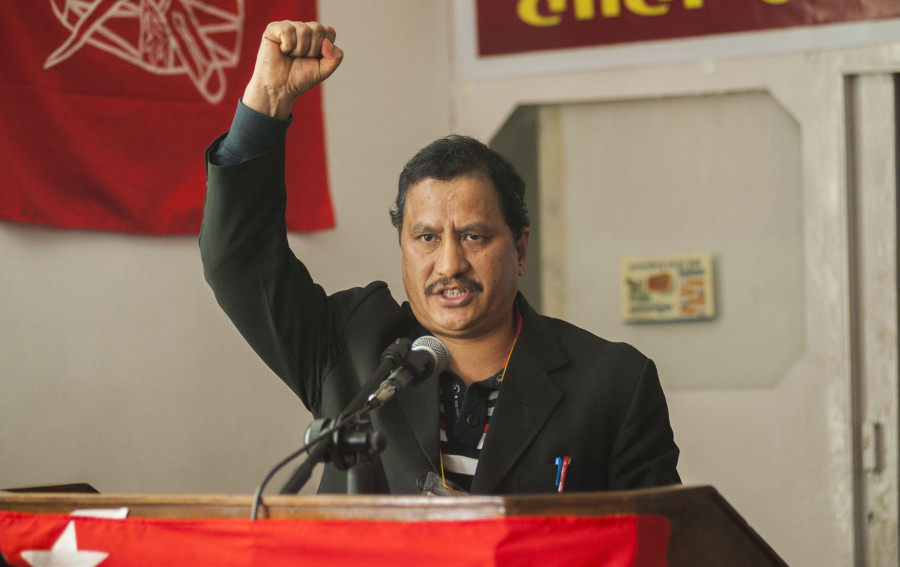National
Contain Chand-led party’s activities before they get out of hand, analysts say
Observers say the more the incumbent government fails, the bigger space it will create for anti-democratic forces.
Tika R Pradhan
When the government in March last year branded the Communist Party of Nepal a criminal outfit, Prime Minister KP Sharma Oli told his fellow leaders that all the activities of the Netra Bikram Chand-led party would be controlled within six months.
Hundreds of leaders and cadres of the Chand-led party were arrested in subsequent months, just as it continued to carry out extortions, arson and other violent activities.
But on Tuesday, one action by the Chand outfit shook the nation. It killed a school principal in Morang in what came as a chilling reminder of the decade-long Maoist insurgency which left over 13,000 dead, 1,333 disappeared and hundreds of thousands displaced.
Back in January 2002, the Pushpa Kamal Dahal-led Maoist party too had slain a schoolteacher, Muktinath Adhikari of Panini Sanskrit Secondary School, in Duradanda, Lamjung.
Since its inception in 2014, the Chand-led party has been involved in violent activities, as it has clearly said that it wanted a “unified people’s revolution”. Chand, who was a firebrand leader in the Maoist party, has argued that Dahal left the “people's war” halfway and abandoned the revolution.
The party had long been accused of carrying out arson and extortions. The government decided to call it a criminal outfit after a blast in February last year in Nakkhu of Lalitpur resulted in the death of a person.
Immediately after it was declared a criminal outfit, Chand in a statement had warned of retaliation.
But authorities, observers say, seem to have taken its warnings too lightly.
According to them, the brutal killing of the schoolteacher by the Chand party seems to have emanated from its desperation of being noticed and such a cowardly act could have been prevented had the government taken a proper approach to deal with it.
“It [the killing] is a heinous crime by an entity that says it is striving to bring about a change. But the government too has not acted responsibly,” said Devendra Raj Pandey, who was actively engaged in bringing the former Maoists to the peace process. “How [this] government has dealt with the situation is not worth commenting on.”
In August 2018, the Oli government had formed a dialogue committee led by Nepal Communist Party (NCP) leader Som Prasad Pandey to hold talks with various disgruntled groups, including the Chand-led party.
But after the Chand-led party refused to join the talks, the Oli administration failed to take any initiatives to bring it to the negotiating table. Instead, it took a high-handed approach. Several Chand party cadres were arrested. Some of them were killed by security forces after arrest. Even the National Human Rights Commission had raised concerns over the killing of Kumar Poudel, the Sarlahi district in-charge of the Chand party, ‘after he was taken into custody’.
The killing of the schoolteacher comes at a time when some forces are calling for scrapping the country’s current political system. The Chand party too has been calling the present regime “fascist”.
The regime led by the Nepal Communist Party (NCP) is a combination of Prime Minister Oli’s CPN-UML and Dahal’s Maoist Centre.
Chand was a loyal soldier of Dahal when the Maoist party led the decade-long insurgency. But Chand, along with Mohan Baidya and Ram Bahadur Thapa, had deserted Dahal’s party in 2012.
Chand, however, decided to part ways with Baidya and Thapa in 2014 to form his own Communist Party of Nepal. Thapa returned to Dahal’s Maoist party in 2016 and is currently the home minister.
Once comrades in arms, Chand and Thapa today, however, are pitted against each other. Thapa as the home minister has always maintained a tough stance against Chand.
Shyam Shrestha, a political commentator who has followed Nepal’s leftist politics including the Maoist insurgency, said the more the government fails, the wider space it will create for forces like Chand’s.
According to him, the government has taken the approach of suppressing forces like those led by Chand.
“This strategy won’t work,” said Shrestha. “If the government worked for the people, ensured good governance and controlled corruption, forces led by Chand and others that are calling for reinstatement of the monarchy would never get a chance.”
Many say the government’s failure to realise how the Chand party could unleash terror also had to do with Tuesday’s incident. On top of that, the long-drawn transitional justice process too has prompted impunity, according to them.
“Conflict experts around the world say delay in implementing peace accords leads to violence,” said Daman Nath Dhungana, a former Speaker and a civil society leader. “For the delayed justice, all successive governments are responsible.”
According to Dhungana, the government seems to be failing to assess the threat the [Chand] outfit could pose to the society.
“It must decide now how to deal with the Chand party so as to stop it from committing further violence,” said Dhungana.
Observers say there should be no place for violence in the society and that since Nepal has already faced a bloody war, the government of the day must make prudent decisions to not let another cycle of violence repeat in the country.
According to Hari Roka, a political scientist who has closely watched the Maoist conflict, the government’s approach to dealing with the Chand outfit has been wrong since its early days.
“Their activities seem to be increasing but the situation is not in their favour,” said Roka. “The party itself is not clear what it wants to achieve and how. So the government has ample opportunity to bring them to peaceful politics.”




 8.79°C Kathmandu
8.79°C Kathmandu















